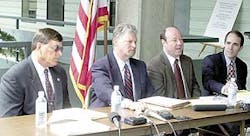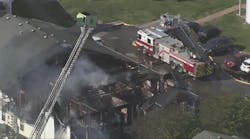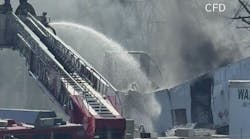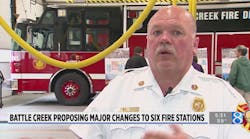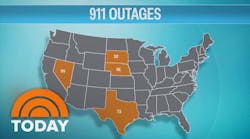There were breakdowns in the communication between firefighters attacking the fatal November fire that killed three Coos Bay firefighters, the Oregon Occupational Safety and Health Division said Friday.
There was a failure to immediately establish a command structure at the fire scene.
There was a failure to obey a "two-in, two-out" rule that requires firefighters to be suited up and waiting outside a burning structure while two others are inside.
In all, OSHA's nearly six-month investigation was capped Friday by a finding of 16 violations of federal safety standards, 13 of them classified as serious. The findings resulted in $50,450 in fines against the city of Coos Bay.
Fire Chief Stan Gibson, praised in November for quickly identifying the smoldering blaze at the Farwest Truck & Auto Supply store, took the brunt of OSHA's criticism without visible emotion Friday morning. He had perhaps saved four lives in November by ordering the building evacuated when he noticed the roof of the building was turning spongy during the early stages of the fight.
Fire Department Violations Cited in OHSA ReportThe following report was complied from Oregon Occupational Safety and Health Division information released Friday. The Oregon Occupational Safety and Health Division identified 16 violations of federal safety standards following an investigation into the deaths of three firefighters who perished battling a November blaze. Thirteen were considered serious violations. OSHA levied $50,450 in fines against the city.
The violations include:
The incident management system did not meet the requirements of the National Fire Protection Association standards. Several standards were believed to have been violated, including breakdowns in communication and the absence of a Rapid Intervention Team inside the building.
Total penalty: $7,000.
At least two firefighters were not situated outside the building, ready to set up an emergency rescue.
Total penalty: $5,000.
Not all firefighters at the scene were being actively tracked by a personnel accountability system.
Total penalty: $5,000.
Employees did not receive annual tests to ensure that respirator facepieces supplied to them were tight fitting. Eight elements comprise this violation for each employee affected.
Total penalty: $13,000.
A respirator was not used in a dangerous situation when one firefighter went onto the roof without one.
Total penalty: $2,500.
The city did not ensure that each employee could use a respirator effectively during an emergency.
Total penalty: $5,000.
Medical evaluations were not provided to determine employees' ability to wear a respirator.
Total penalty: $1,500.
Employees required to wear respirators were not regularly consulted to identify problems or assess program effectiveness.
Total penalty: $1,250.
Written respiratory protection program did not include all federally required elements.
Total penalty: $500.
Repair and maintenance of respiratory equipment was not performed according to manufacturer's recommendation.
Total penalty: $1,500.
Respirators used in emergency situations were not inspected daily.
Total penalty: $500.
The program administrator overseeing a respiratory protection program did not have the appropriate qualifications.
Total penalty: $500.
The 24 volunteer firefighters had not received physical assessments within the past year.
Total penalty: $7,200.
Three additional violations were identified by OSHA. They were classified as "other than serious" and do not carry a monetary penalty. All 16 violations described are alleged and are subject to formal and informal appeals.
Standing among a small press crowd gathered on a landing outside Coos Bay City Hall, where OSHA officials set up a folding table and an American flag, Gibson made no comments and issued no appeals to OSHA's findings. Instead, he listened, stoically, to the report.
"We must learn from this tragedy," said Peter De Luca, commissioner of the Occupational Safety and Health Division as he unveiled the findings. "If we do not learn, then this tragedy is that much greater."
De Luca said OSHA's investigation didn't link the violations with the firefighters' deaths and wouldn't draw conclusions that the three could have survived had none of the violations occurred.
"None of these violations can be purported to be the source of these deaths," De Luca said.
But an official with the state's firefighting union was not as certain.
Pat West, president of the Oregon State Council of Firefighters, which is associated with the International Association of Firefighters, stopped short of claiming the violations caused the deaths of the firefighters.
But West said the violations did play a part in the fire-fighting response, which resulted in the deaths of volunteer firefighters R. Chuck Hanners, 33; Jeff E. Common, 30; and Lt. Randall Carpenter, 46.
"The lack of a command structure certainly had an impact on their deaths," he said.
"Those things that didn't happen in this fire certainly had an impact," he added.
West said the fines and the results of the investigation should send a national message to fire departments to better ensure the safety of their employees.
"We have the most dangerous profession in the U.S.," he said. "We don't need to make it more difficult."
Here in Coos Bay, the message was received but OSHA's findings also are being challenged.
City Council President Jeff McKeown said he disagrees with OSHA's findings but, while praising the quality of the firefighters, added that the agency's investigation can help improve the department's safety.
"Do we see this as an opportunity to make this a better fire department?" McKeown said. "Yes, we do."
Coos Bay Mayor Joe Benetti, who has pledged to appeal OSHA's findings, said the city is just beginning to inspect the violations alleged, adding that many issues raised by the agency already have been addressed. He said the city will question the violations and expects that most of the fines can be reduced.
"We believe we can provide Oregon OSHA with information to better understand the imprecision of those allegations," Benetti said.
The city has 20 days to appeal a citation informally with OSHA.
A formal appeal also can be filed with the Workers' Compensation Board, an independent agency within the Department of Consumer & Business Services. In that case, a hearing would be held before an administrative law judge in the Hearings Division of Workers' Comp.
City officials have been puzzled and frustrated by the fact that the violations were not identified during a voluntary inspection held in August and September. The week before the Nov. 25 fire, OSHA produced a report of the department finding several minor violations such as grounded electrical plugs that needed to be replaced and ladders that were not rated for commercial use.
Why, McKeown and Benetti asked, did OSHA not identify the violations prior to the November fire?
De Luca, for the first time on Friday, addressed the question, saying that OSHA conducted only a brief overview of three city departments, spending a half-day addressing safety issues. In contrast, the investigation that followed the November fire was wide-ranging and took nearly all of the allotted 180 days.
"The two processes are different," he said briefly.
OSHA's investigation, spurred by the fire, addressed only workplace safety issues. An investigation by the State Fire Marshal was charged with identifying the cause of the blaze.
Only days after the blaze, the State Fire Marshal's Office indicated heat from an oven at Automotive Machine Services, an independent business operating inside Farwest, caused roofing materials to burst the building into flames.
City officials could not find any permits for the oven or its flue and no inspection was done by building officials after the equipment was installed. Following the fire, Building Inspector Joe McClay determined the flue violated building codes because it did not extend the required length above the roof.
Jonathan E. Inskeep, 58, owner of Automotive Machine Services, and contractor Verlin Glen Villines, 61, are scheduled to stand trial in December on charges of criminally negligent homicide in connection with the three firefighters' deaths.
Meanwhile, Inskeep filed a notice with the city, preserving the right to sue anytime within the next six years. His attorney, Nick Nylander, of Coos Bay, said the claim arises out of negligent building-code and fire inspections and the negligent firefighting techniques and strategies performed by employees and/or officers and representatives of the city of Coos Bay.
Dan Knox, an attorney with Schwabe, Williamson and Wyatt, the Portland firm representing the city, said he believes OSHA's findings will not impact the potential suit against the city and added that Coos Bay is protected from legal action.
"(Unless) somebody is willing to say the city intentionally killed these men, the employer is immune from suit," Knox said.
Knox is expected to lead the defense for the city if Inskeep files suit.
Regardless of the OSHA findings, Benetti said Gibson continues to have the city's support and is not facing any disciplinary action. Lt. Randy Miles, president of the local union, said he doesn't believe the union will file any grievances against the chief.
"We'll sit down and analyze the report," Miles said. "At this point, I wouldn't expect any."
The fine issued to the city in connection with the three deaths is on the low end of the scale. OSHA has not investigated a firefighter fatality since 1991, when a firefighter suffered a heart attack en route to a blaze. But in other workplace safety investigations that have resulted in fatalities, OSHA has levied much stiffer penalties.
De Luca said a Portland firm was fined $1.5 million when a parking structure collapsed, killing one man in Portland. The monetary amount of the fine, De Luca said, is not indicative of the loss suffered by Coos Bay and the firefighting community.
"In no way can this possibly be equated with the loss of human life," De Luca said. "It's not meant to be."
Related Coverage:
- Oregonian (May 17): Coos Bay Fined Over Fatal Fire
- May 1, 2003: Men Charged with Negligent Homicide in Ore. Firefighters' Deaths
- Nov. 28, 2002: Investigators: Hidden Fire Likely Burned for Hours
- Nov. 27, 2002: Ore. Firefighters Leave Legacy of Bravery, Fellowship
- Nov. 27, 2002: Firefighters from Around Oregon Come to Help
- Nov. 27, 2002: Community in Shock Over Deaths of Three Firefighters
- Nov. 26, 2002: Tragedies Like the Coos Bay Fire Cause Us to Think ... As They Should
- Nov. 26, 2002: Coos Bay Tragedy: The Victims and Memorial Information
- Nov. 25, 2002: Roof Collapse Takes Three Oregon Firefighters
